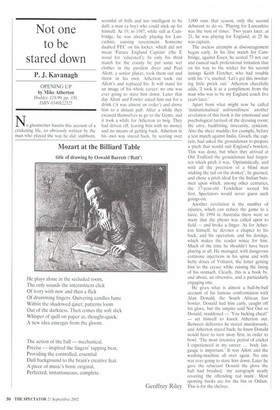Not one to be stared down
P. J. Kavanagh
OPENING UP by Mike Atherton Hodder, .E18.99, pp. 330, ISBN 0340822325 No ghostwriter haunts this account of a cricketing life, so obviously written by the man who played the way he did: stubborn. scornful of frills and too intelligent to be dull; a man (a boy) who could stick up for himself. At 19, in 1987, while still at Cambridge, he was already playing for Lancashire, causing resentment. Someone daubed FEC on his locker, which did not mean 'Future England Captain' (the E stood for 'educated'). In only his third match for the county he put some wet clothes in the pavilion dryer and Paul Allott, a senior player, took them out and threw in his own. Atherton took out Allott's and replaced his. It will stand for an image of his whole career: no one was ever going to stare him down. Later that day Allott and Fowler asked him out for a drink (it was almost an order') and drove him to a distant pub. After a while they excused themselves to go to the Gents, and it took a while for Atherton to twig. They had driven off, leaving him with no money and no means of getting back. Atherton in his own way stared back, by scoring over 1,000 runs that season, only the second debutant to do so. 'Playing for Lancashire was the best of times.' Two years later, at 21, he was playing for England; at 25 he was captain.
The useless attempts at discouragement began early. In his first match for Cambridge, against Essex. he scored 73 not out and caused such professional irritation that on his way to the wicket for his second innings Keith Fletcher, who had trouble with his cr's, snarled, 'Let's get this iwwitating little pwick out.' Atherton cheerfully adds, 'I took it as a compliment from the man who was to be my England coach five years later.'
Apart from what might now be called 'institutionalised unfriendliness' another revelation of this book is the emotional and psychological turmoil of the dressing room; the envy, backbiting, insecurity, cynicism. Also the sheer muddle; for example, before a test match against India, Gooch, the captain, had asked the groundsman to prepare a pitch that would suit England's bowlers. This was done, but when they arrived at Old Trafford the groundsman had forgotten which pitch it was. 'Optimistically, and with all the precision of a blind man sticking the tail on the donkey', he guessed, and chose a pitch ideal for the Indian batsmen upon which, among other centuries, the 17-year-old Tendulkar scored his first. Spectators would never guess such goings-on.
Another revelation is the number of injuries, which can reduce the game to a farce. In 1994 in Australia there were so many that the physio was called upon to field — and broke a finger. As for Atherton himself, he devotes a chapter to his back, and his operation, and his dosings, which makes the reader wince for him. Much of the time he shouldn't have been playing at all. He managed, with dangerous cortisone injections in his spine and with hefty doses of Voltarol, the latter getting him to the crease while ruining the lining of his stomach. Clearly, this is a book by, and about, an obsessive, and a particularly engaging one.
He gives what is almost a ball-by-ball account of his famous confrontation with Alan Donald, the South African fast bowler. Donald had him early, caught off his glove, but the umpire said Not Out so Donald, maddened — 'You fucking cheat!' — set himself to knock Atherton out. Between deliveries he stared murderously, and Atherton stared back; he knew Donald would have to turn away first, in order to bowl. 'The most intensive period of cricket I experienced in my career ... body language is important.' It was Allott and the washing-machine all over again. No one was ever going to stare him down. Later he gave the reluctant Donald the glove the ball had brushed, 'my autograph neatly covering the offending red mark'. Most sporting books are for the bin or Oxfam. This is for the shelves.










































































 Previous page
Previous page